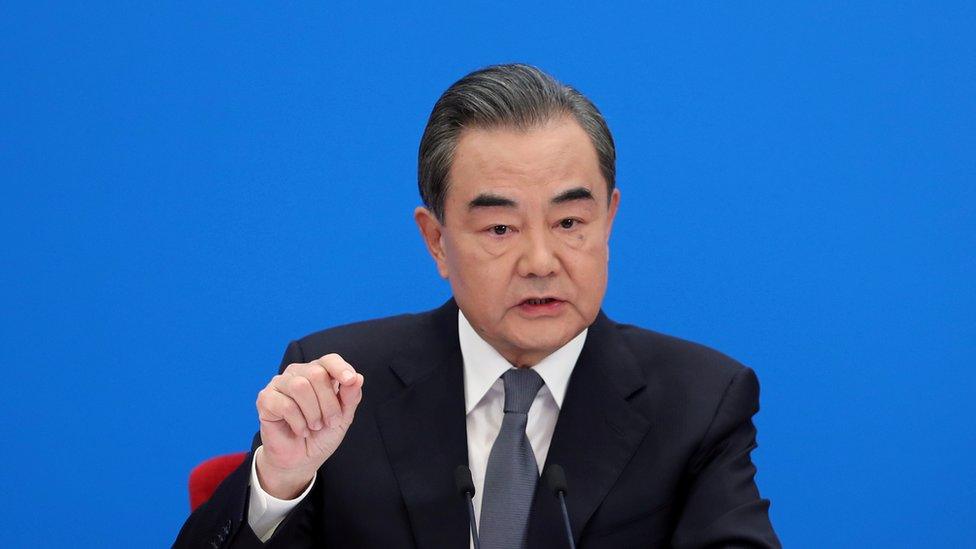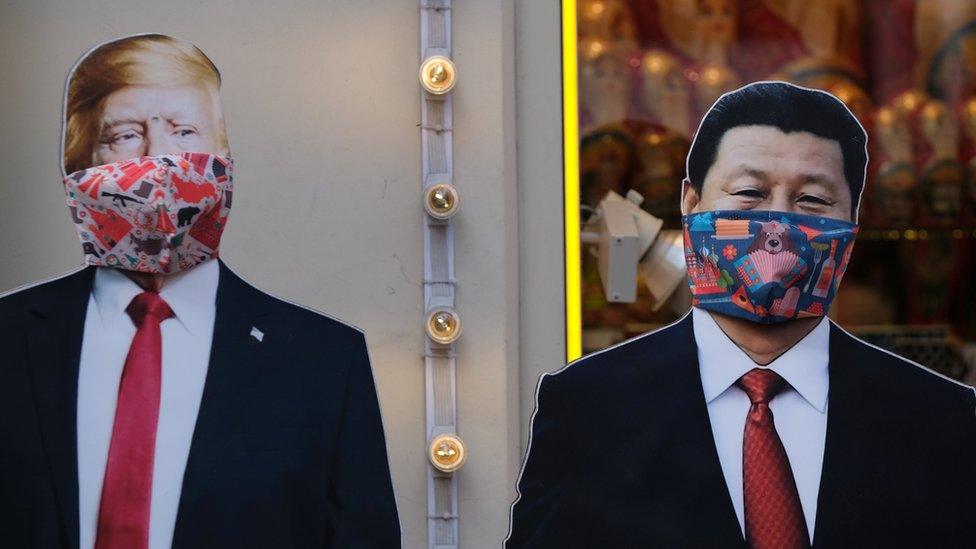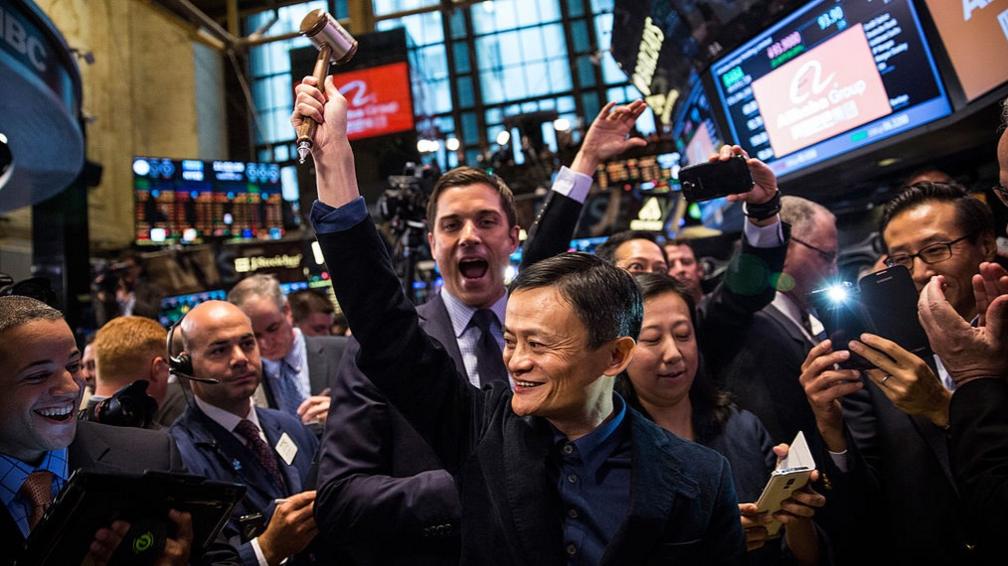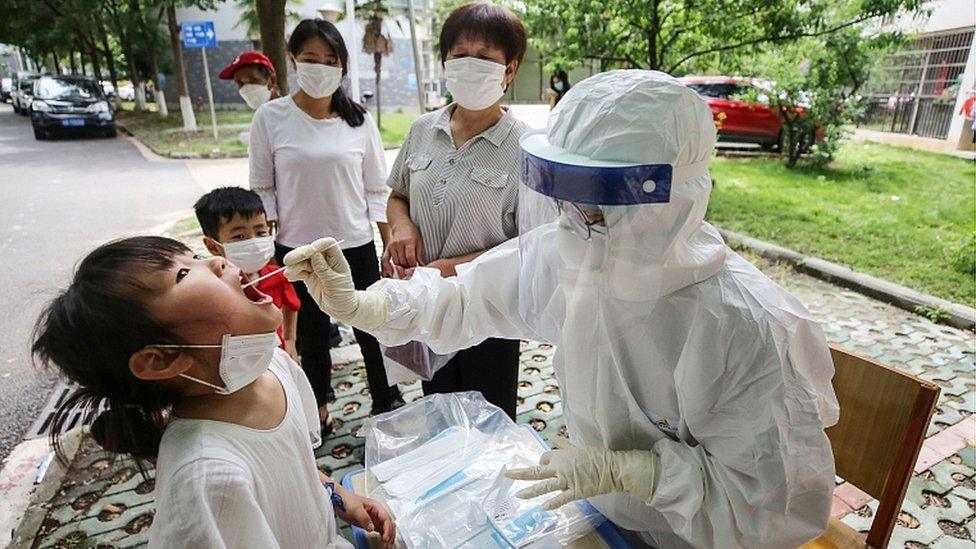Coronavirus: China accuses US of spreading 'conspiracies'
- Published

The country's top diplomat, Wang Yi, said some US politicians had "disregarded basic facts"
China's foreign minister has accused the US of spreading "conspiracies and lies" about the coronavirus, ratcheting up tensions between the two nations.
The US has been infected by a "political virus" that compels some politicians to repeatedly attack China, Wang Yi told reporters on Sunday.
He urged the US to "stop wasting time and stop wasting precious lives" in its response to the Covid-19 outbreak.
Tensions between Washington and Beijing have escalated as the virus has spread.
US President Donald Trump, who faces re-election this year and has been criticised for his handling of the pandemic, has blamed China for trying to cover up the outbreak.
But on Sunday, Mr Wang repeated China's assertions that it had acted responsibly to safeguard global public health since the virus first emerged in December.
What else did China say?
Speaking at an annual news conference during China's parliamentary session, Mr Wang said that "some political forces in the US are taking China-US relations hostage".
He did not specify what those forces were, but said they were trying to "push our two countries to the brink of a new Cold War".
"Aside from the devastation caused by the novel coronavirus, there is also a political virus spreading through the US," he continued.
"This political virus is the use of every opportunity to attack and smear China," he said. "Some politicians completely disregard basic facts and have fabricated too many lies targeting China, and plotted too many conspiracies."
But he called for co-operation between Washington and Beijing in tackling the outbreak.
"Both of us bear a major responsibility for world peace and development," he said. "China and the United States stand to gain from co-operation, and lose from confrontation."
What's the bigger picture here?
President Trump and Beijing have traded repeated barbs in recent weeks, on issues from the World Health Organization (WHO) to potential lawsuits against China over its alleged cover-up of the outbreak.
The two world powers have experienced longstanding friction over issues such as trade and human rights, but tensions have risen dramatically amid the pandemic.
On Sunday, Mr Wang said the suggestion that US states could bring legal action against China was "a daydream" and lacked any precedent.
He also defended the WHO and its head Tedros Adhanom Ghebreyesus, who has been the target of recent US criticism.
Last week, President Trump accused the WHO of being a "puppet of China" that had let Covid-19 spin "out of control" at the cost of "many lives".
He then shared a letter he had sent to Dr Tedros, which outlined specific issues the US had regarding the WHO's Covid-19 response.
Allow X content?
This article contains content provided by X. We ask for your permission before anything is loaded, as they may be using cookies and other technologies. You may want to read X’s cookie policy, external and privacy policy, external before accepting. To view this content choose ‘accept and continue’.
Dr Tedros has agreed to a review over the agency's handling of the pandemic.
But Mr Wang told reporters on Sunday that China fully backed the organisation. "To support the WHO is to support saving lives. This is the choice any country with a conscience should make," he said.
He did not say whether international scientists would be permitted to enter China to investigate the outbreak. The WHO has called on Beijing to allow it access to investigate the source.
What are the accusations against China?
The coronavirus outbreak first emerged in the Chinese city of Wuhan late last year and was widely reported to have originated in a food market.
Since then, however, some senior US politicians have suggested that the source was a research facility in Wuhan that had been carrying out research on bat coronaviruses. China has dismissed the idea.

The pandemic has worsened relations between Donald Trump's America and Xi Jinping's China
Mr Pompeo said earlier this month that there was "a significant amount of evidence" that the virus came from a laboratory in Wuhan. He later appeared to step back, saying "we know it began in Wuhan, but we don't know from where or from whom".
And on Saturday, the director of the Wuhan Institute of Virology told state media that claims that the virus could have leaked from the facility were "pure fabrication".
Wang Yanyi said the centre had "isolated and obtained some coronaviruses from bats" but stressed that these were sufficiently different to Covid-19.
Last month, senior Chinese diplomat Chen Wen told the BBC that demands for an investigation into the source of the outbreak were politically motivated and that such a move would only divert attention and resources away from fighting the virus.

LOCKDOWN UPDATE: What's changing, where?
AIR TRAVELLERS: The new quarantine rules
GLOBAL SPREAD: Tracking the pandemic
RECOVERY: How long does it take to get better?
A SIMPLE GUIDE: What are the symptoms?

- Published21 May 2020

- Published21 May 2020

- Published19 May 2020
